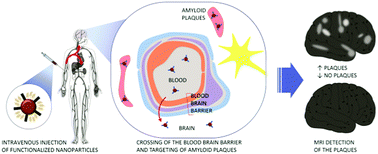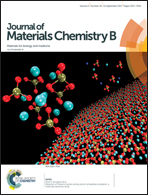Nanoparticles as contrast agents for brain nuclear magnetic resonance imaging in Alzheimer's disease diagnosis
Abstract
Nuclear Magnetic Resonance Imaging (MRI) of amyloid plaques is a powerful non-invasive approach for the early and accurate diagnosis of Alzheimer's disease (AD) along with clinical observations of behavioral changes and cognitive impairment. The present article aims at giving a critical and comprehensive review of recent advances in the development of nanoparticle-based contrast agents for brain MRI. Nanoparticles considered for the MRI of AD must comply with a highly stringent set of requirements including low toxicity and the ability to cross the blood–brain-barrier. In addition, to reach an optimal signal-to-noise ratio, they must exhibit a specific ability to target amyloid plaques, which can be achieved by grafting antibodies, peptides or small molecules. Finally, we propose to consider new directions for the future of MRI in the context of Alzheimer's disease, in particular by enhancing the performances of contrast agents and by including therapeutic functionalities following a theranostic strategy.

- This article is part of the themed collection: Recent Review Articles


 Please wait while we load your content...
Please wait while we load your content...